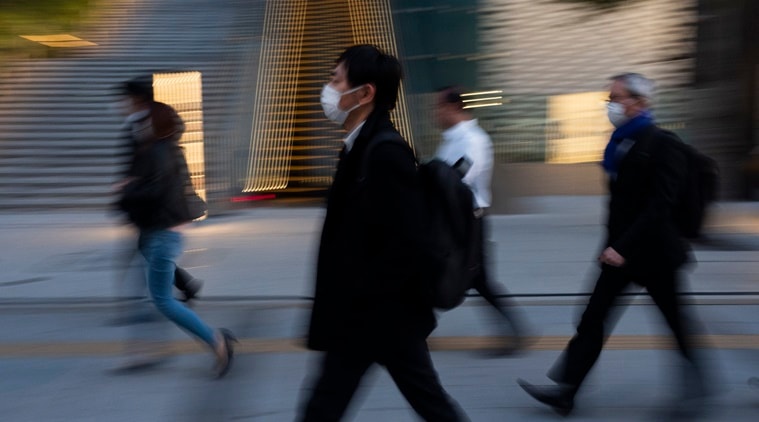 After the US, Spain reported 226,629 infections followed by Italy (197,675), France (162,220), Germany (157,770), the United Kingdom (154,037) and Turkey (110,130). (AP Photo/Jae C. Hong/file)
After the US, Spain reported 226,629 infections followed by Italy (197,675), France (162,220), Germany (157,770), the United Kingdom (154,037) and Turkey (110,130). (AP Photo/Jae C. Hong/file)
The Covid-19 worldwide tally stood at 2,971,639, with as many as 2,06,542 fatalities, even as countries prepared to relatively ease down the lockdown measures to gradually resume daily life and economic activity. The United States continued to be the worst affected, with over 960,000 cases and over 52,000 deaths.
After the US, Spain reported 226,629 infections followed by Italy (197,675), France (162,220), Germany (157,770), the United Kingdom (154,037) and Turkey (110,130). No fresh deaths were reported from mainland China, the country’s health ministry said Monday.
Here is a look at some of the top global developments:
UN raises alarm about police brutality in lockdowns
The U.N. human rights office voiced concern on Monday about more than a dozen countries that have declared states of emergency due to the COVID-19 pandemic where police have arrested or detained hundreds of thousands of people and killed others. “Emergency powers should not be a weapon governments can wield to quash dissent, control the population, and even perpetuate their time in power,” U.N. High Commissioner for Human Rights Michelle Bachelet said in a statement that denounced shootings and detentions without being specific.
A top official from her office said about 80 countries have declared emergencies due to the new coronavirus, including 15 where the allegations were deemed most troubling. They were: Nigeria, Kenya, South Africa, the Philippines, Sri Lanka, El Salvador, Dominican Republic, Peru, Honduras, Jordan, Morocco, Cambodia, Uzbekistan, Iran and Hungary.
However, Georgette Gagnon, director of field operations, added at a virtual briefing in Geneva “there are probably several dozen more we could have highlighted”.” A main concern on exceptional emergency measures is what has been described as a toxic lockdown culture in some countries,” Gagnon said.
War-hit Yemen struggles to trace COVID-19 infection
When doctors first confirmed Yemeni port official Saleh had contracted COVID-19, authorities raced to trace his movements to try and protect one of the world’s most vulnerable countries. But almost three weeks on, they still do not know whether Yemen’s first laboratory-confirmed case is really the individual at the root of what could be an unusually devastating outbreak.
The information gap reflects Yemen’s inability to detect, let alone repel, an infection humbling far wealthier nations. Split into rival power centres, its medical infrastructure shattered by war and seen by the United Nations as the world’s worst humanitarian crisis, Yemen is handicapped by its own destitution in its fight against the new coronavirus.
Altaf Musani, the head of the World Health Organisation (WHO) Yemen mission, said transmission of the disease in Yemen could be in what he called a phase of “individual cases”, a possible prelude to clusters of infection. But it is proving impossible to identify so-called “patient zero”, an important step in tracking and tracing all those potentially exposed to infection and containing an outbreak.
CDC adds six new symptoms
The Centers for Disease Control and Prevention has added six new possible symptoms for the novel coronavirus (COVID-19) infection. Previously, the US’ top health body had declared fever, cough, and shortness of breath as the symptoms.
The new possible symptoms, as updated by the CDC, include chills, repeated shaking with chills, muscle pain, headache, sore throat, and new loss of taste or smell. Shortness of breath has also been updated to ‘shortness of breath or difficulty breathing’. The full list now includes fever, cough, shortness of breath or difficulty breathing, chills, repeated shaking with chills, muscle pain, headache, sore throat, and new loss of taste or smell.
The CDC also added that a runny nose rarely happens with COVID-19 and that sneezing is still not a symptom of the virus infection. It also added that the above symptoms ‘may appear 2-14 days after exposure to the virus’.
UK stock markets jump on signs of coronavirus cases easing
London-listed shares joined a global rally on Monday as signs of an easing in the coronavirus outbreak raised hopes a month-long lockdown was working, while diagnostics firm Novacyt surged on news of a supply contract with the UK government. The clinical diagnostics company jumped 12.8% after saying it would supply its coronavirus testing kits to the UK’s Department of Health and Social Care for an initial period of six months starting next week.
The domestically focussed midcap index rose 2.3%, as Prime Minister Boris Johnson returned to Downing Street almost a month after he was diagnosed with COVID-19. An earlier report said Johnson could announce a plan to ease the lockdown as early as this week, but on Monday he warned it was still too dangerous for fear of a deadly second outbreak. The government is next due to review social distancing measures on May 7.
After Covid-19 recovery, Johnson prepares for lockdown exit
 Confirmed coronavirus cases in the UK stand at 152,840. (File)
Confirmed coronavirus cases in the UK stand at 152,840. (File)
With British Prime Minister Boris Johnson returning home after recovering from Covid-19 Sunday, his first challenge will be unveiling a plan to ease the ongoing lockdown. Johnson has been urged to reveal the lockdown exit strategy after Foreign minister Dominic Raab announced that the lockdown and social distancing measures would be extended for another three weeks and would last at least till 3 May.
The official number of deaths related to COVID-19 in hospitals across the United Kingdom rose to 20,732, up by 413 in 24 hours, while confirmed cases stood at 152,840, up by 4,463.
Italy to partially lift lockdown from May 4
Italy is preparing to lift Europe’s longest coronavirus lockdown by allowing factories and building sites to reopen from May 4, besides permitting limited family visits, Italian Prime Minister Giuseppe Conte said on Sunday. The country is planning to reopen the economy without triggering a new wave of coronavirus infections.
“We expect a very complex challenge,” Conte said as he outlined the road map to restarting activities put into hibernation since early March. “We will live with the virus and we will have to adopt every precaution possible,” he added.
White House aiming for Trump pivot from virus to economy
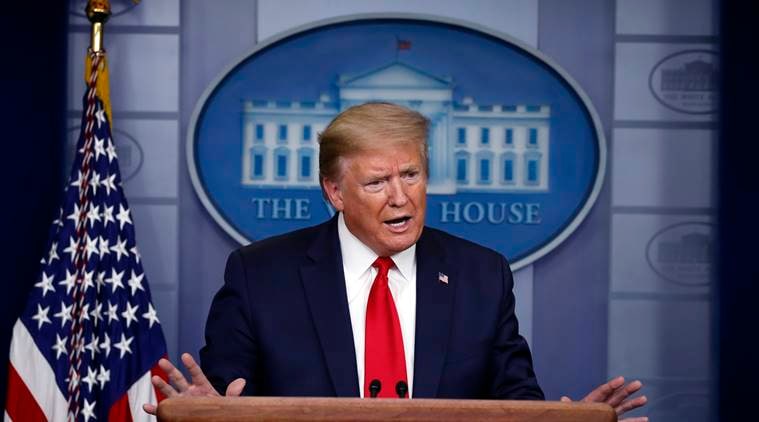 President Donald Trump speaks about the coronavirus in the James Brady Press Briefing Room of the White House in Washington. (AP Photo/Alex Brandon, File)
President Donald Trump speaks about the coronavirus in the James Brady Press Briefing Room of the White House in Washington. (AP Photo/Alex Brandon, File)
The White House is planning to shift US President Donald Trump’s public focus to the burgeoning efforts aimed at easing the economic devastation caused by the pandemic. Days after he publicly mused that scientists should explore the injection of toxic disinfectants as a potential virus cure, Trump has now rejected the utility of his daily task force briefings where he has time and again clashed with scientific experts.
The shift comes in conjunction with what the White House sees as encouraging signs across the country with the pace of new infections stabilising and deaths declining.
Coronavirus mortality rate slowing in Canada
Canada’s top medical official Sunday said the slowing coronavirus mortality rate in Canada was encouraging while Prime Minister Justin Trudeau said isolation measures to fight the outbreak should remain for the time being. Canada’s public health agency said the death toll had risen by less than 10 per cent for the seventh day in a row, climbing by under 6 per cent to 2,489. The figure for those diagnosed with the coronavirus was 45,791, up from 44,364.
COVID-19 could cause famine in about 3 dozen countries: UN food chief
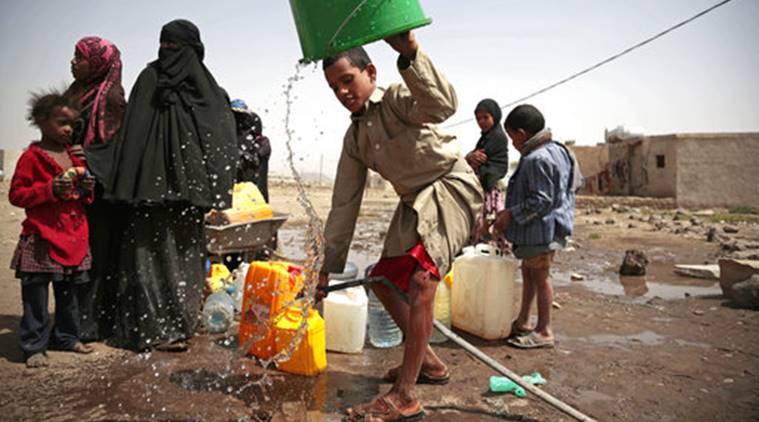 WFP is providing food to nearly 100 million people on any given day. (AP Photo/Hani Mohammed, File)
WFP is providing food to nearly 100 million people on any given day. (AP Photo/Hani Mohammed, File)
The head of World Food Program David Beasley warned the UN Security Council last week that as the world deals with the COVID-19 pandemic it is “on the brink of a hunger pandemic” that could lead to “multiple famines of biblical proportions” within a few months if immediate action isn’t taken.
Beasley said he has been on the phone with leaders of some of the world’s richest nations with a critical message: the coronavirus pandemic is not only affecting your economy but is impacting the economies of vulnerable and conflict-torn countries where millions of people will face starvation if you cut the UN agency’s funding for food. “If we have money and access we can avert famine and we can truly avert catastrophic humanitarian death from starvation,but if we lose our funding, or we lose supply chain, there’s going to be disaster.” he added.
WFP is providing food to nearly 100 million people on any given day, including “about 30 million people who literally depend on us to stay alive,” Beasley said. And if those 30 million people can’t be reached, “our analysis shows that 300,000 people could starve to death every single day over a three-month period” and that doesn’t include increased starvation due to the new coronavirus.
“In a worst-case scenario, we could be looking at famine in about three dozen countries,” and in 10 of them there are already more than 1 million people per country on the verge of starvation.
France Covid-19 deaths cross 22,000 as govt seeks to ease lockdown
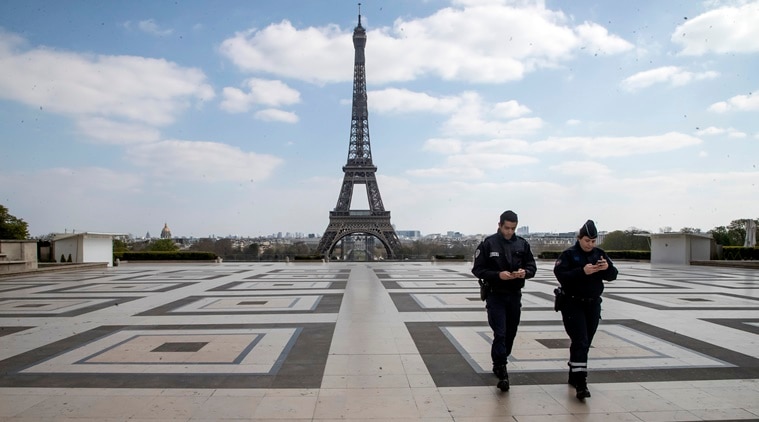 The first coronavirus case in France(also in Europe) was confirmed on 24 January in Southwestern part of the country. (AP Photo/Michel Euler)
The first coronavirus case in France(also in Europe) was confirmed on 24 January in Southwestern part of the country. (AP Photo/Michel Euler)
The death toll in France from the coronavirus has risen by 242 to 22,856, the health ministry said on Sunday, as the government prepares to see how it might ease a national lockdown that has been in place since mid-March. While the number of deaths from the virus has risen, the rate at which the casualties have mounted has steadily fallen over the last two weeks, emboldening those who want France to start to lift the lockdown measures.
South Korea could announce reopening of schools
South Korean Prime Minister, Chung Syekyun instructed education officials to prepare hygiene and social distancing measures so the government could announce a timeline for reopening schools no later than early May. South Korea reported 10 fresh cases of the coronavirus as officials mull reopening schools.
The republic has 10,738 cases and 243 deaths according to latest figures released by the Korean Centre for Disease Control and prevention. Using an active test and quarantine program South Korea has managed to slow its outbreak without lockdowns or business bans. But schools remain shut while providing children remote learning.
New Zealand eases rules on strict lockdown
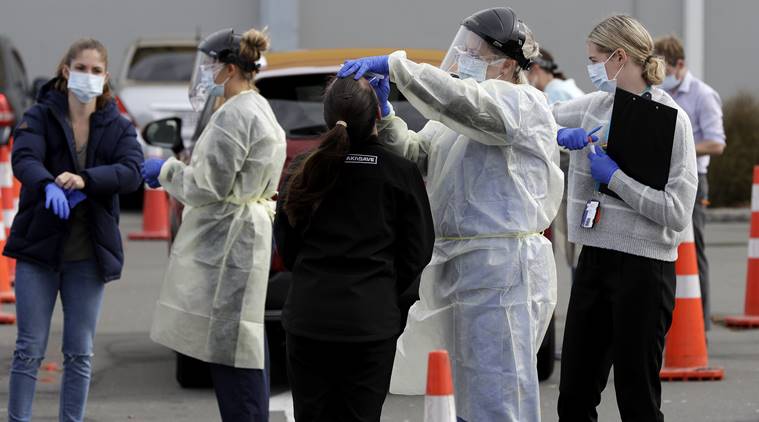 There is no widespread undetected community transmission in New Zealand. (AP Photo/Mark Baker)
There is no widespread undetected community transmission in New Zealand. (AP Photo/Mark Baker)
New Zealand partially lifted its strict lockdown on Monday that has been in place for 4 weeks now. Prime Minister Jacinda Ardern said there hasn’t been a widespread community transmission of the coronavirus till now and the country had managed to avoid the worst scenarios for an outbreak.
She said it would continue to hunt down the last few cases as the nation gets ready to ease the rules on a strict lockdown from midnight. “There is no widespread undetected community transmission in New Zealand. We have won that battle. But we must remain vigilant if we are to keep it that way,” she added.
From midnight certain businesses such as construction will be allowed to reopen but social distancing rules will still apply.
Mexico clears migrant shelters to fight the pandemic
Over the past five weeks, almost all migrant shelters in Mexico have been cleared due to the coronavirus pandemic, sending most of them back to their native countries. The National Migration Institute (INM), in order to comply with health and safety guidelines, said it had been removing migrants from its 65 facilities, which harbored 3,759 people since March 21.
Mexico’s Health Ministry on Sunday reported 835 new confirmed cases of coronavirus infections and 46 additional fatalities, bringing the total infections in the country to 14,677 and 1,351 deaths.The government has said the real number of infected people is significantly higher than the confirmed cases.
Israeli court takes step to halt phone tracking amid virus
Israeli Supreme Court Sunday ordered the Shin Bet security agency to halt its use of phone surveillance technology in the battle against the coronavirus unless Parliament begins legislating guidelines for the controversial practice. In its decision, the court said the Parliament must begin the legislative process by Thursday. The ruling came hours after Israel’s embattled Health Minister said he would step down following a public uproar over his handling of the crisis and his own Covid-19 infection
Meanwhile in the Middle East, Saudi Arabia signed a 264 million deal with China to provide the ability to conduct 9 million coronavirus tests Syria said its schools will remain closed for the rest of the school year while the Gaza Strips Hamas rulers said they will allow restaurants and coffee shops to reopen.